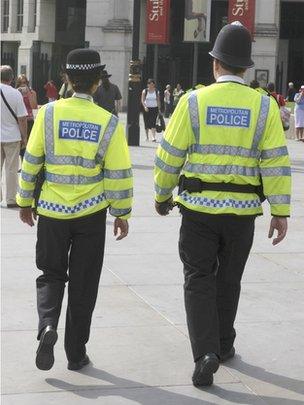The private life of a police force
- Published
- comments

I have to admit to puzzlement as to why the "breathtaking" proposals that private firms may deliver some police functions have so shocked people - not least senior figures within the previous government.
After all, many of aspects of "privatisation" they say worry them were introduced during Labour's time in office.
The shadow home secretary Yvette Cooper says she has "very serious concerns" about plans by West Midlands and Surrey forces to enter into contracts with profit-making companies to provide services many people would consider policing functions.
The former deputy prime minister John Prescott has described the process as "extremely alarming", launching a campaign to "keep the police public".
And the Police Federation, which tends to regard outsourcing as a potential threat to its members' jobs, has called the proposals "an extremely dangerous road to take".
The affair, it transpires, has its origins inside the Home Office and meetings held between the Police and Justice Minister Nick Herbert and the chief constables of West Midlands and Surrey.
It was the minister, I am told, who encouraged the two forces to push ahead with their outsourcing initiative and some central government funding was made available to help make it happen.
Mr Herbert is enthusiastic in promoting innovative thinking as to how shrinking budgets might be spent more efficiently so money can be focused on what he regards as "core policing". However, he would not and could not claim a patent on what West Midlands and Surrey are considering.
The plain fact is that a lot of the functions included in the current exercise, and that so exercise the Labour opposition, have been contracted out to private companies for years.
In a statement earlier this week, Yvette Cooper said: "The possibility of including the management of high-risk individuals, patrolling public places or pursuing criminal investigations in large private sector contracts rather than core professional policing raises very serious concerns."
Well, let's go through those categories.
Management of high-risk individuals
Currently, the security giant G4S alone monitors some 14,000 individuals on behalf of the Home Office and Ministry of Justice. Private companies supply tagging services for electronic curfews and satellite tracking of offenders. They provide secure transportation for moving high-risk prisoners and others, as well as running prisons and operating custody suites in police stations.
Since 2003 and with the Labour government's blessing, G4S (under the control of a police sergeant) has managed 500 police cells in Lancashire, South Wales and Staffordshire with all the functions that go with that:
searching, fingerprinting and photographing detainees
identity parades and identification procedures
undertaking constant watch duties
completing witness statements
preparing all charges and case management
statutory drug testing of arrested persons
seizing items as evidence
preparing and managing bail
undertaking footwear impressions
forensic sampling and forensic medical services
If the anxiety is about the monitoring of, say, serious sex offenders, as one chief constable told me on Tuesday, this often comes down to an officer checking every few months that an individual is still living where his or her licence requires. Worth remembering that not so long ago, this function would have been the responsibility of the probation service and not the police at all.
Patrolling public places
It all depends on what you call a "public place" but private security firms already patrol and guard major public sector construction projects, railway lines, MoD bases, and public buildings such as government departments, shopping malls and pedestrian precincts. G4S will provide security patrols for the London Olympics and private security firms routinely police football matches and other public events.
I remember reporting for the BBC 20 years ago on an estate which had its own private beat bobbies - a security firm had been hired by residents to patrol the neighbourhood because they wanted a greater uniformed presence than the police were providing.
The question for some is whether private security staff are going to replace badged police officers on the streets. So far, I have not seen any suggestion that they will.
In fact, the Chair of the Surrey Police Authority, Peter Williams, invited me to read his lips: "There is absolutely no question of private security staff replacing beat bobbies. You will not see G4S staff parading through Guildford on patrol."
Pursuing criminal investigations
Right now, about 500 civilians (mostly former police officers) are working with forces in the UK on criminal investigations. When a big inquiry comes along, the senior investigating officer may well look to hire trained assistance from the private sector.
For example, a few years ago when detectives in Jersey were faced with the huge criminal investigation into child abuse, they recruited extra help from a private recruitment agency.
Don't forget that private security firms already conduct criminal fraud investigations for insurance companies and other institutions, handing over evidence to the police at the conclusion of their inquiries.

Forensic investigations, initiated by the police, may well be conducted by a profit-making company in what is a highly competitive market.
To be shocked by the police use of private companies, as outlined in the contracts being considered by West Midlands and Surrey, implies ignorance of the enormous changes in the way policing has become a partnership service with other agencies, including the private sector, over the past decade or two.
When I bumped into David Hanson, the shadow policing minister for England and Wales on Tuesday, he said his greatest concern was that the contracts could last for up to 15 years, locking forces into arrangements that ministers or elected police and crime commissioners could not undo.
Another of Labour's anxieties is that decisions on which crimes or criminals to pursue, or what priorities to follow, might be made in the interests of a private company rather than the public good.
But this is an argument that critics made against many of the widespread reforms of public services that Labour introduced, in policing and elsewhere.
The accountability argument is one that must be dealt with at the contract stage. Next Tuesday, companies wanting to get a slice of the police budget in Surrey and West Midlands will attend a bidding conference, with Peter Williams telling me he would be there to ensure that nothing was agreed "unless it delivers benefits to us".
There will be concerns about how far civilianisation and outsourcing should go as police forces look to focus their limited resources on core responsibilities. The question what are the police for, that I explored in my recent BBC Radio 4 series of the same name, is one that Labour's independent commission on policing will undoubtedly be obliged to consider.
The president-elect of the Police Superintendents' Association of England and Wales, Irene Curtis, has told me that while "outsourcing of policing services has been done by the private sector for years", she's concerned as to "where the line is drawn with core police services and where those services are provided by a company that is not under the complete control of the chief constable".
Peter Williams , of the Surrey Police Authority, does not even accept the word "outsourcing" for what they are considering. He prefers to describe the potential contracts as a "partnership" - with a chief constable retaining full control.
For some, it comes down to a question of political ideology. Do we think all these functions should be done by the state, in this case by fully-trained warranted police officers? That central argument was conducted a decade ago and the Labour government's answer back then was "no".